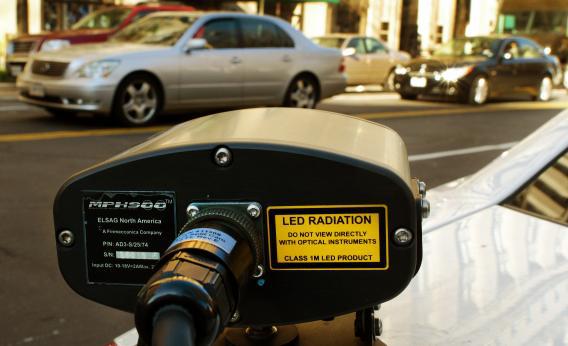It’s happening under the radar of most Americans—but perhaps not for much longer.
Police forces across the United States are quietly investing in vehicle tracking technology that can store vast quantities of data about people’s movements, according to the ACLU. The civil liberties group is drawing attention to an interesting 2012 report from the Police Executive Research Forum, which states that 85 percent of police agencies plan to acquire or increase their use of license plate recognition cameras within the next five years.
Automatic license plate readers are used in public places, mounted much like security cameras on telephone poles or sometimes on police patrol cars. They are designed to photograph the license plates of all cars that pass by, processing the information automatically and sending it to a database along with location data. This is highly useful for tracking stolen vehicles or the movements of criminals. But the ACLU is alarmed about the issue of data retention, warning about the “creation of databases with location information on every motorist who encounters the system, not just those whom the government suspects of criminal activity. Police departments nationwide are using ALPR to quietly accumulate millions of plate records, storing them in backend databases.”
The 85 percent statistic cited in the research report was based on a survey of some 70 forces that was conducted in 2011. That means it is likely many of the forces that were then only planning to invest in readers have purchased the technology by now. (At the time of the survey, 71 percent said they were already using it, “to some extent.”)
The fear from a privacy standpoint is that once it is effectively deployed nationwide, it can be used as a kind of mass, warrantless tracking system. Such concerns earlier this month prompted state Rep. Todd Rutherford, D-Columbia to propose a bill in the South Carolina House that would ban the technology in the state. “There is nothing to protect [the data],” Rutherford said. “All they are doing is collecting it.” According to the ACLU, there are currently only two states, Maine and New Hampshire, with “positive laws” governing how the technology can be used. New Hampshire bans them, according to the Wall Street Journal, and Maine requires data to be deleted after 21 days unless it is part of an investigation.
The controversy over ALPR is not unique to the United States, either. It was a major issue in the United Kingdom a couple of years ago. Despite public opposition, however, law enforcement agencies implemented a network of more than 10,000 cameras, which were processing up to 15 million images per day as of 2011. The United Kingdom now has a centralized number plate recognition data center. On the other hand, Germany has taken a more stringent approach, with its constitutional court ruling in 2008 that the indiscriminate nationwide collection and retention of number plate data violated the country’s strict privacy laws. Ottawa, Canada, has also seen heated debate this month about how the technology should be used by cops.
As legislators and advocacy groups like the ACLU push for privacy-protecting regulations, the issue will almost certainly heat up. That means you can add it to a growing list of new law enforcement technologies currently facing calls for greater regulation—from drones, and location tracking devices to behavior prediction tools, and biometric databases.
